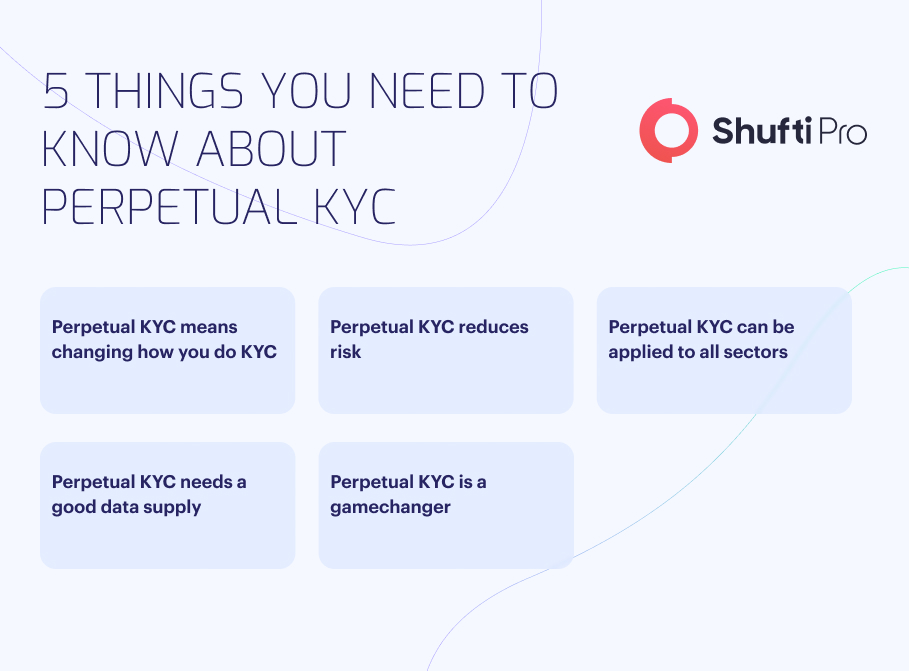Perpetual KYC: The Future of Due Diligence in the Financial Industry

Digital transformation is paving the way for quick growth in the compliance sphere. However, regulators are demanding enhanced accountability from financial firms regarding keeping and updating client data; standard Know Your Customer (KYC) used during onboarding often falters, which is where Perpetual KYC (pKYC) comes into play.
Understanding Traditional vs Perpetual KYC
KYC refers to the laws and regulations that require businesses to verify that current customers are who they claim to be. With conventional KYC processes, companies can verify clients at the start of their relationship when any user creates a new account, or at set periods afterwards —reverifying them annually.
Perpetual KYC takes the process to the next level by performing ongoing Customer Due Diligence (CDD). The method reverifies clients on a regular basis and flags any suspicious activities, mitigating the risk of fraud.

Key Challenges Faced by Organisations
Acquiring current data on customer relationships is not an easy task. Compliance teams often struggle to maintain ongoing monitoring.
Some of the common challenges encountered include:
- Determining the frequency of updates
- Overly complicated KYC processes
- Balancing the latest and ongoing checks
- Limited resources
Why Perpetual KYC is the Future of Due Diligence
Perpetual KYC is the next big thing in the customer due diligence process. Here’s how it benefits businesses:
1. Increase Profitability
Deploying KYC solutions and the associated infrastructure is an ongoing expense for a company. As regulations evolve, bringing about constant updates and amendments, the cost of keeping up with such regulatory changes is a growing concern. This is where perpetual KYC comes to the rescue.
With perpetual KYC, corporations do not have to conduct periodic checks as their customer data is current and accurate. This, as a result, reduces their KYC operating expenses and enhances profitability.
2. Enhance Data
To perform robust perpetual KYC, there’s a need for a large volume of data from multiple sources. Not only getting the data but using it intelligently helps firms understand customers’ behavioural patterns and the risk they may pose. However, the periodic review-led operational model limits valuable insights, but perpetual KYC facilitates real-time analysis of suspicious transactions. This approach enhances security as it flags any suspicion and captures them before they may wreak havoc on businesses and customers.
3. Reduce Risk
For any firm to calculate a customer’s risk level, the firms need data as accurate and current as possible. A full KYC is conducted every five years if there is a low-risk customer. However, the client risk level can never remain the same throughout this period, making this KYC review obsolete as soon as it is finished.
Assessing any customer’s level of risk that they may pose to any business should not be a one-time practice. It should be something that businesses monitor on a regular basis. Cutting corners whilst analysing clients’ risk levels is no longer acceptable with the ever-changing regulatory landscape. The fluctuating risk levels posed by clients throughout the duration of a relationship must be analysed by businesses; this is where perpetual KYC comes in, checking the risk level on a continuous basis and ensuring effective prevention of ID theft and financial crime.
4. An End to Remediation
KYC remediation is the practice of updating customer profiles and information to keep them current in terms of accuracy, risk mitigation, and regulatory compliance. However, the process is demanding and costly, draining the resources of the internal departments and requiring a large workforce.
But how does a perpetual KYC facilitate KYC remediation? PKYC nullifies the necessity for remediation. The main idea behind PKYC is updating customer profiles and information on a regular basis. By doing so, businesses can abide by the changing regulations and assess the risk level they may pose as the data they have about them is up-to-date.
5. Boost Customer Experience
Currently, the KYC process involves a scheduled examination of customer data. When the firm has to conduct a periodic review, requiring clients to provide numerous forms of documentation. Unfortunately, this method is not a pleasant experience and perhaps inefficient for the company or the client completing it. Thus, such requests are denied or forgotten, leading to a strained relationship between customers, employees, and businesses. This is an undoubtedly bad outcome for all parties involved, but pKYC has the ability to mend this.
Perpetual KYC helps resolve this problem by eliminating the need for conducting periodic checks and updating client data on event-based triggers. Implementing perpetual KYC makes sending emails to firms and clients and internal communication a thing of the past. Customers are able to focus on what they are doing with the KYC process running in the background, updating data automatically and generating red flags when any suspicion occurs.
And one added bonus of Perpetual KYC is that it positively contributes to the client onboarding process, manages the risk and identifies revenue opportunities.
How Does Shufti Fit in the Puzzle?
Shufti offers an IDV suite to 230+ countries and territories. The AI-powered IDV solution verifies customers within seconds and mitigates the risk of fraudulent activities. Not only this, it helps financial firms abide by KYC regulations and avoid hefty monetary penalties.
Still confused about how an identity verification solution work?

 Explore Now
Explore Now













